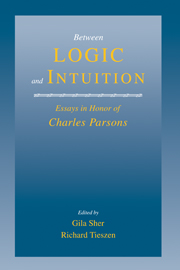Book contents
- Frontmatter
- Contents
- Preface
- I LOGIC
- Paradox Revisited I: Truth
- Paradox Revisited II: Sets – A Case of All or None?
- Truthlike and Truthful Operators
- ‘Everything’
- On Second-Order Logic and Natural Language
- The Logical Roots of Indeterminacy
- The Logic of Full Belief
- II INTUITION
- III NUMBERS, SETS AND CLASSES
- Name Index
On Second-Order Logic and Natural Language
Published online by Cambridge University Press: 02 December 2009
- Frontmatter
- Contents
- Preface
- I LOGIC
- Paradox Revisited I: Truth
- Paradox Revisited II: Sets – A Case of All or None?
- Truthlike and Truthful Operators
- ‘Everything’
- On Second-Order Logic and Natural Language
- The Logical Roots of Indeterminacy
- The Logic of Full Belief
- II INTUITION
- III NUMBERS, SETS AND CLASSES
- Name Index
Summary
Introduction
I explore some considerations on behalf of, and against, second-order logic that take for at least part of their motivation the properties of natural languages. A couple of preliminary remarks are appropriate here.
First, there is the question of whether second-order logic really is logic. Suppose that logic is understood in a traditional way, as the most general theory of the true and the false, abstracting from the subject matter of the special sciences, but applicable to all of them. The traditional conception certainly includes all of the logic of the truth functions – that much of logic arises as soon as we have distinguished truth from falsehood – but it is not altogether trivial to arrive at the conclusion that even first-order logic is logic. The reason is that, besides truth and falsehood, first-order logic requires the additional notion of satisfaction, or a predicate's being true of an object, hence two additional concepts, that of ‘truth of’ and that of an object. However, if all first-order logic is admitted as logic, then second-order logic appears at first to require, at most, only one further additional concept, namely, that of the value of a predicate variable. Supposing this concept acceptable, second-order logic would have the required degree of generality and topic neutrality: it is not biased in such a way as to exclude (except, perhaps, by failing to contain enough logical resources) any special science from being expounded in a language of which it is the logic.
- Type
- Chapter
- Information
- Between Logic and IntuitionEssays in Honor of Charles Parsons, pp. 79 - 99Publisher: Cambridge University PressPrint publication year: 2000
- 15
- Cited by



